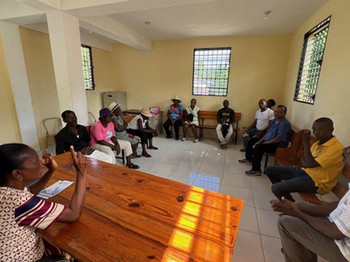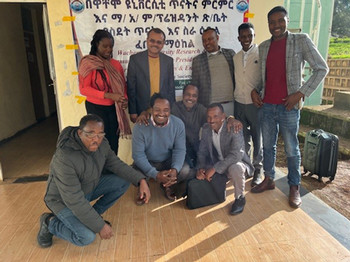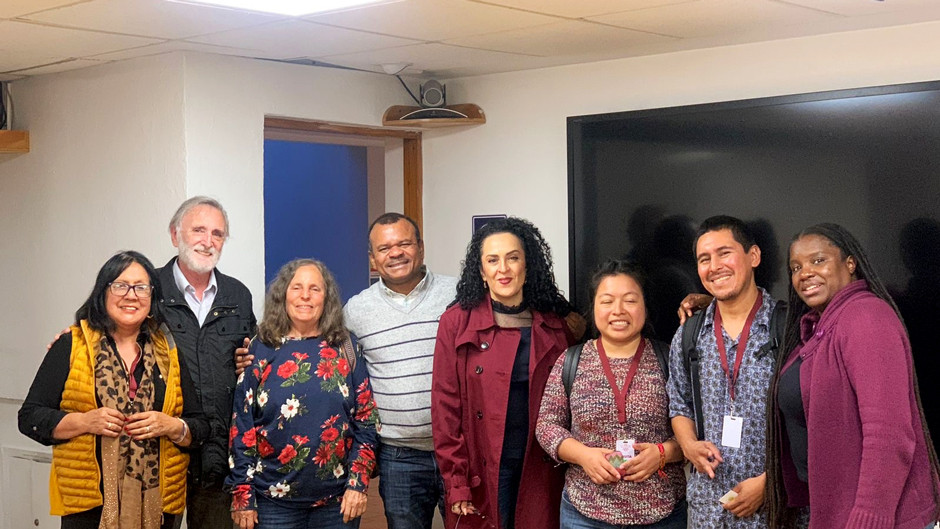Louis Herns Marcelin has been on the road a lot lately.
The professor of anthropology at the University of Miami College of Arts and Sciences is one of the co-directors of a five-year global migration study spanning 12 countries. This year, the study has taken him to Brazil, Costa Rica, Ethiopia, Haiti, Mexico, and Rwanda.
Funded by the United Kingdom Research & Innovation Global Challenges Research Fund, the Migration for Development and Equality Hub study involves a global team of more than 120 researchers. Now in its final year, it has produced a trove of data that students and faculty at the University of Miami and around the world are using to better understand migration between and within countries in the Global South.
“What we are looking at is the intersecting layers of inequalities that both drive migration and limit its potential to contribute to personal, societal, and global development,” Marcelin explained. “To what extent people’s mobility reinforces inequalities and to what extent migration can create space for reducing inequalities in sending, transit, and destination countries.”
Building interdisciplinary connections with researchers across the globe to study some of the most difficult human experiences has been a hallmark of Marcelin’s work. A sociocultural anthropologist, he often probes questions related to power, violence, and marginalization.

Herns Marcelin, third from right, meeting with members of a cooperative in Les Anglais, Haiti. Photo: INURED
Nearly 20 years ago, Marcelin led the creation of the Interuniversity Institute for Research and Development (INURED) in Haiti with the support of other faculty at the University. INURED has since partnered with universities and community-based organizations in Haiti and other countries. The institute, which supports research and scientific training in Haiti, has hosted numerous faculty and students from the University. It is currently one of the partner institutions in the global migration study.
“INURED is an opening to the Caribbean, to the issues of the Caribbean,” Marcelin said. “It was founded in 2007 and, despite Haiti’s crisis, continues to function.”
Among its many accomplishments, INURED conducted the first national study on violence against children in Haiti, which was funded by the U.S. Centers for Disease Control and Prevention (CDC) in partnership with UNICEF. The CDC, UNICEF, and state agencies in Haiti have used this study to develop a framework for child protection in the country.
INURED, which is coordinated by Toni Cela in the Department of Anthropology, has also run intervention studies that seek to improve the lives of marginalized groups. One such study on the impacts of Hurricane Matthew in Haiti looked at how women’s cooperatives can help people in rural areas recover from natural disasters.
The study was initially supported by a University alumnus and donor who provided funding to boost the entrepreneurial activities of women’s cooperatives, offering seed grants, business training, and other educational support to help the cooperatives make their businesses more resilient. After earning a profit, the cooperatives then gave seed funds to other women-led cooperatives in their community.
The project, which began in 2018, has supported four rounds of women-led cooperatives. In the town of Les Anglais in southern Haiti, the cooperatives have used their earnings to build a community bank that funds microenterprises.

Toni Cela, left, and Herns Marcelin, second from left, with Virtual Museum of Migration and Mobilities collaborators in Addis Ababa, Ethiopia. Photo: INURED
“Grassroots-led and collaborative efforts such as this illustrate how communities in Haiti, if supported and empowered, can leverage their local assets and skills to address problems that have undermined their livelihoods and human development for generations,” Marcelin said.
Marcelin has also forged connections with researchers in other parts of the world. He previously led the creation of the University’s global health program, and last year, he traveled to Japan to visit Juntendo University, which sought his guidance to revamp its global health program. In October, the College hosted a delegation from Juntendo University to further the collaboration between both institutions.
Now, as Marcelin and his team wrap up the global migration study, he and Cela are working with the Lowe Art Museum and other partners around the world to build the Virtual Museum of Migration and Mobilities. Through artwork, memorials, stories, music, poetry, studies, and policies, the museum—slated to go live in 2025—will feature more inclusive narratives of migration.
“People don’t stay in place; people move. The entire history of our species has been a history of moving, whether we are forced to move through enslavement, the results of colonial conquests and dispossession, or climate change, or voluntarily because we want to explore and create new paths for humanity,” Marcelin said. “Encounters of people in time and space have always been the fundamental driver of knowledge.”

